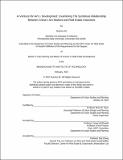| dc.contributor.advisor | Brent D. Ryan. | |
| dc.contributor.author | Ni, Ruichen. | en_US |
| dc.contributor.other | Massachusetts Institute of Technology. Department of Urban Studies and Planning. | en_US |
| dc.contributor.other | Massachusetts Institute of Technology. Center for Real Estate. Program in Real Estate Development. | en_US |
| dc.coverage.spatial | a-cc--- | en_US |
| dc.date.accessioned | 2021-12-17T17:09:12Z | |
| dc.date.available | 2021-12-17T17:09:12Z | |
| dc.date.copyright | 2021 | en_US |
| dc.date.issued | 2021 | en_US |
| dc.identifier.uri | https://hdl.handle.net/1721.1/138531 | |
| dc.description | Thesis: M.C.P., Massachusetts Institute of Technology, Department of Urban Studies and Planning, February, 2021 | en_US |
| dc.description | Thesis: S.M. in Real Estate Development, Massachusetts Institute of Technology, Program in Real Estate Development in conjunction with the Center for Real Estate, February, 2021 | en_US |
| dc.description | Manuscript. | en_US |
| dc.description | Includes bibliographical references (pages 138-148). | en_US |
| dc.description.abstract | In the past two decades, in China, integrating art components, cultural institutions, and various artistic scenes in commercial real estate has become popular development and management practices in first-nd second-tier cities. The capital flow between the two industries has become increasingly frequent. Real estate companies have evolved from space providers for arts to a more influential stakeholder in the local art ecosystem, facilitating the growth of art industries. Through collaborations with real estate projects artists find alternative ways to sustain art production as well as a widened and closer connection to the general public. Successes in both ends have encouraged the joint venture on art + real estate to continue. This thesis critically investigates forms of symbiosis between art and real estate industries in China. The research aims to reveal and reflect on the two industries' interdependency with a close examination of the artist communities' historical evolution in cities and new endeavors combined art and real estate. It focuses on the following questions: how do real estate and art professionals collaborate and benefit from the joint venture? What are the motivation, idea, and vision? Are the strategies effective? Are there issues under the flourishing market? Who are the winners and losers? Through site visits, interviews with selected real estate and art professionals, artists, and a gathering of secondary sources, the research categorizes and analyzes art + development collaborations into two primary forms: art districts and art placement. It zooms into two representative case studies that are publicly regarded to be successful and innovative: Aranya and K11. The thesis's objective is to remind real estate about the value and power of art in urban developments beyond its function as a commercialized product, suggesting a more ethical business thinking and recommendations to create a favorable art ecosystem around real estate projects. | en_US |
| dc.description.statementofresponsibility | by Ruichen Ni. | en_US |
| dc.format.extent | 148 pages | en_US |
| dc.language.iso | eng | en_US |
| dc.publisher | Massachusetts Institute of Technology | en_US |
| dc.rights | MIT theses may be protected by copyright. Please reuse MIT thesis content according to the MIT Libraries Permissions Policy, which is available through the URL provided. | en_US |
| dc.rights.uri | http://dspace.mit.edu/handle/1721.1/7582 | en_US |
| dc.subject | Urban Studies and Planning. | en_US |
| dc.subject | Center for Real Estate. Program in Real Estate Development. | en_US |
| dc.title | A venture for art + development : examining the symbiosis relationship between China's art market and real estate industries | en_US |
| dc.title.alternative | Venture for art plus development | en_US |
| dc.title.alternative | Examining the symbiosis relationship between China's art market and real estate industries | en_US |
| dc.type | Thesis | en_US |
| dc.description.degree | M.C.P. | en_US |
| dc.description.degree | S.M. in Real Estate Development | en_US |
| dc.contributor.department | Massachusetts Institute of Technology. Department of Urban Studies and Planning | en_US |
| dc.contributor.department | Massachusetts Institute of Technology. Center for Real Estate | en_US |
| dc.identifier.oclc | 1281718023 | en_US |
| dc.description.collection | M.C.P. Massachusetts Institute of Technology, Department of Urban Studies and Planning | en_US |
| dc.description.collection | S.M. in Real Estate Development Massachusetts Institute of Technology, Program in Real Estate Development in conjunction with the Center for Real Estate | en_US |
| dspace.imported | 2021-12-17T17:09:11Z | en_US |
| mit.thesis.degree | Master | en_US |
| mit.thesis.department | UrbStud | en_US |
| mit.thesis.department | RED | en_US |
